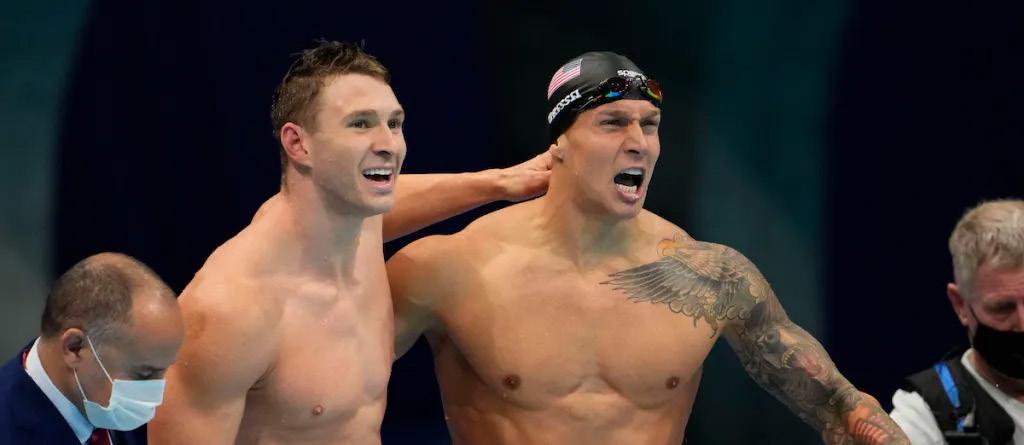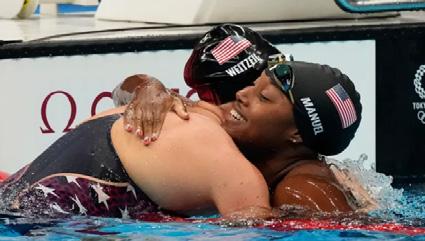
6 minute read
RYAN MURPHY AND TEAM USA CAPTAINS PROVIDED MAJOR IMPACT THROUGH THEIR LEADERSHIP
>> Ryan Murphy & Caeleb Dressel
BY JOHN LOHN - EDITOR-IN-CHIEF
Advertisement
In recent years, Nathan Adrian would play the role. Jason Lezak, too. Count Natalie Coughlin and Brendan Hansen in the category. Same for Elizabeth Beisel. They were all captains for the United States at the Olympic Games. Their performances in the pool were critical to the success of Team USA, while their actions out of the water had just as much of an impact on what unfolded.
Name someone captain of a National Team and pressure is immediately added to that individual’s job. His/her workload is enhanced, personal responsibilities complemented by duties that will promote the betterment of the team cause. Sometimes, an athlete’s actions are enough to handle the role fluidly. Teammates watch and emulate. In other instances, there is the need for vocalization, a pick-them-up speech an example.
The United States went to work at the Olympic Games in Tokyo with a highly accomplished quartet of captains. Simone Manuel and Allison Schmitt were elected to guide the women’s team. Ryan Murphy and Caeleb Dressel got the nod for the men. It was an all-star group, all destined for future induction into the International Swimming Hall of Fame.
But these four athletes were about significantly more than their championship pedigrees between the walls. Consider:
• Manuel was the epitome of perseverance. Hampered by Overtraining Syndrome, a diagnosis she revealed at the United States Olympic Trials, Manuel did not qualify to defend her Olympic title in the 100 freestyle. However, she dug deep and earned a Tokyo bid in the 50 freestyle, then contributed a leg to the United
States’ bronze-medal winning 400 freestyle relay. More important, she spoke about her journey and the pride she felt. Her story is one of inspiration – and a lesson. • Schmitt has long been open about her mental-health struggles, and has taken a proactive role in emphasizing the importance of an individual’s mental well-being.
On television, while racing on the biggest stage, these athletes are not just machines. They are human, and
Schmitt is reminding the world of that fact. • Dressel is now a seven-time Olympic champion, his Tokyo run featuring five gold medals. He, too, is more than the greatest swimmer on the planet. He is introspective during interviews, routinely providing a reminder that the sport does not define him. It is what he does. It is not who he is. Dressel allows himself to be vulnerable. He tears up on the medals stand. During press conferences, he admits to feeling overwhelmed at times. It is a true sentiment, and one he doesn’t try to cover up with bravado. • Murphy is the picture of calm and possesses an awareness of his surroundings that belies his 26 years of age. He knows when a teammate needs to hear certain words. He’s not afraid to speak up about critical topics in the sport. He can lighten the mood when necessary.
Murphy supplied the best line of the press conference featuring the men’s 400 medley relay, which captured gold and set a world record. The Floridian discussed his age-group
days in Florida and joked about a meet in which he would clash with a standout 4-year-old who was setting the water on fire. He was referencing Dressel. The tongue-in-cheek comment elicited laughs from the room and provided a small glimpse into Murphy’s personality and ability to break a moment with humor.
Five years ago, in his Olympic debut in Rio de Janeiro, Murphy was perfect. He swept the backstroke events and led off the United States’ victorious medley relay with a world record. This time around, Murphy collected bronze in the 100 backstroke, silver in the 200 backstroke and gold in the medley relay, where the U.S. shattered the 2009 super-suit world record.
Increasing his career Olympic-medal count to six accounted for just a portion of the importance of Murphy as a captain. Twice, his voice was a factor inside the Tokyo Aquatics Centre. We’ll start with his latter vocalization, the words that were needed for the United States to finish the meet in strong fashion.
After the United States finished fifth in the inaugural mixed medley relay, Murphy chatted with Dressel about the chance for redemption a day later, when the men’s 400 medley relay would conclude the meet – and give the U.S. a chance to exit Tokyo on a high note. It was an important conversation to have, so the team would go into the final day not carrying baggage but looking at an opportunity.
“I think as athletes, we are always looking to the next thing,” Murphy said. “Even as we come into these mixed zones after a race, we’re always looking at the next race. Right after the mixed medley, it’s like, ‘OK, that is done and over with. We’ve got a stacked men’s medley coming up. We’ve got to go, warm down, get ready for that.’ And luckily we did that today.”
All the United States did in that closing relay was break the world record, as Murphy jumpstarted the squad with a 52low effort on the backstroke leg. That led to Michael Andrew doing a solid job on breaststroke, with Dressel following with the fastest butterfly split (49.03) in history. The anchor was handled by Zach Apple and his superb mark of 46.95.
After eight days of grueling competition, action that was delayed and threatened by the COVID-19 pandemic, the United States finished the way it wanted, and expects.

Murphy’s other vocalized moment, which came just past the midpoint of the competition, stirred the most controversy of the week but was needed – and required guts to utter. Following his silver-medal finish in the 200 backstroke, which was won by Russian Evgeny Rylov and featured Great Britain’s Luke Greenbank as the bronze medalist, Murphy did not hide his belief that doping is present in the sport, and he was likely a participant in races that were not clean.
“To be clear, my intention is not to make any allegations here,” Murphy said. “Congratulations to Evgeny and Luke. I think they did an incredible job. They’re both very talented swimmers. They both work really hard, (and have) great technique. At the end of the day, I do believe there’s doping in swimming. That is what it is.”
On the heels of his comments, Murphy was dubbed a sore loser and prompted the Russian Olympic Committee to distribute a statement on the issue. The ROC’s commentary was a mix of sarcasm and over-the-top poetics, reeking of smugness. For a country that was found to operate a systematic-doping program and got off with just a slap on the wrist (no flag and no anthem in Tokyo), it was a brazen approach.
Murphy indicated he was not singling out Rylov as a doper but wanted to emphasize his belief that performance-enhancing drugs are part of the sport. It was a statement questioning the International Olympic Committee’s decision to allow Russia to compete, its sanctions hardly commensurate with its violations. It was a message to FINA, under new leadership, that athletes want guarantees of a doping-free sport and transparency in the quest to produce a level playing field.
Simply, Murphy acted as leader. He acted as an advocate for clean sport. He acted as a captain.
The United States departed Tokyo with 30 medals, 10 more than resurgent Australia. It won 11 gold medals, also the highest figure of the competition. Those achievements will be remembered, logged in the history book that documents an unusual Olympiad.
Team USA also departed behind the leadership of four athletes – Manuel, Schmitt, Dressel, Murphy – whose influence will be remembered in a variety of ways. Like those before them, this quartet served its role triumphantly.
>> Abbey Weitzeil and Simone Manuel










